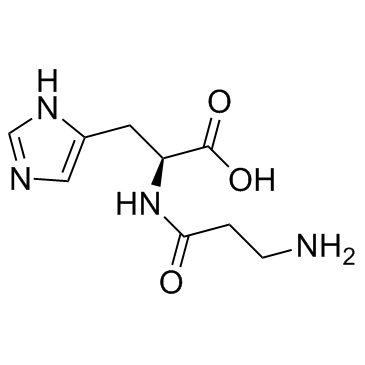L-carnosine

L-carnosine structure
|
Common Name | L-carnosine | ||
|---|---|---|---|---|
| CAS Number | 305-84-0 | Molecular Weight | 226.232 | |
| Density | 1.4±0.1 g/cm3 | Boiling Point | 656.2±55.0 °C at 760 mmHg | |
| Molecular Formula | C9H14N4O3 | Melting Point | 253 °C (dec.)(lit.) | |
| MSDS | Chinese USA | Flash Point | 350.7±31.5 °C | |
|
Hydrogel-based ultra-moisturizing cream formulation for skin hydration and enhanced dermal drug delivery.
Biol. Pharm. Bull. 37(10) , 1674-82, (2014) To develop an external vehicle for skin hydration and enhanced dermal drug delivery, a hydrogel-based ultra-moisturizing cream (HUMC) was successfully formulated with carbopol 934P, urea, Tinocare GL, grape seed oil, and other excipients. The HUMC showed plas... |
|
|
Development of High-purity Certified Reference Materials for 17 Proteinogenic Amino Acids by Traceable Titration Methods.
Anal. Sci. 31 , 805-14, (2015) To ensure the reliability of amino acid analyses, the National Metrology Institute of Japan of the National Institute of Advanced Industrial Science and Technology (NMIJ/AIST) has developed high-purity certified reference materials (CRMs) for 17 proteinogenic... |
|
|
Metabolomic profiling of serum in the progression of Alzheimer's disease by capillary electrophoresis-mass spectrometry.
Electrophoresis 35(23) , 3321-30, (2014) There is high interest in the discovery of early diagnostic biomarkers of Alzheimer's disease, for which metabolomics exhibits a great potential. In this work, a metabolomic approach based on ultrafiltration and analysis by CE-MS has been used to obtain repre... |
|
|
Effects of carnosine on polyamine levels in red blood cells of patients with hypertonic discirculatory encephalopathy.
Bull. Exp. Biol. Med. 154(2) , 210-2, (2012) The levels of polyamines (putrescine, spermine, spermidine) in erythrocytes from patients with hypertonic discirculatory encephalopathy are reduced (by 37, 45, and 50%, respectively) in comparison with the corresponding parameters in the control group. Additi... |
|
|
Ergogenic effects of β-alanine and carnosine: proposed future research to quantify their efficacy.
Nutrients 4(7) , 585-601, (2012) β-alanine is an amino acid that, when combined with histidine, forms the dipeptide carnosine within skeletal muscle. Carnosine and β-alanine each have multiple purposes within the human body; this review focuses on their roles as ergogenic aids to exercise pe... |
|
|
Beta-alanine supplementation in high-intensity exercise.
Med. Sport Sci. 59 , 1-17, (2012) Glycolysis involves the oxidation of two neutral hydroxyl groups on each glycosyl (or glucosyl) unit metabolised, yielding two carboxylic acid groups. During low-intensity exercise these, along with the remainder of the carbon skeleton, are further oxidised t... |
|
|
Endogenous functional compounds in Korean native chicken meat are dependent on sex, thermal processing and meat cut.
J. Sci. Food Agric. 95(4) , 771-5, (2015) In this study the effects of sex, meat cut and thermal processing on the carnosine, anserine, creatine, betaine and carnitine contents of Korean native chicken (KNC) meat were determined. Forty 1-day-old chicks (20 chicks of each sex) from a commercial KNC st... |
|
|
Differential requirement of F-actin and microtubule cytoskeleton in cue-induced local protein synthesis in axonal growth cones.
Neural Dev. 10 , 3, (2015) Local protein synthesis (LPS) via receptor-mediated signaling plays a role in the directional responses of axons to extrinsic cues. An intact cytoskeleton is critical to enact these responses, but it is not known whether the two major cytoskeletal elements, F... |
|
|
Influence of l-carnosine on pro-antioxidant status in elite kayakers and canoeists.
Acta Physiol. Hung. 101(4) , 461-70, (2014) Carnosine is a dipeptide formed from the amino acids β-alanine and histidine and found in large amounts in the brain and muscle, especially fast twitch muscle. Carnosine has an antioxidant role and accounts for about 10% of the muscle's ability to buffer the ... |
|
|
Zinc supplementation influences genomic stability biomarkers, antioxidant activity, and zinc transporter genes in an elderly Australian population with low zinc status.
Mol. Nutr. Food. Res. 59 , 1200-12, (2015) An increased intake of Zinc (Zn) may reduce the risk of degenerative diseases but may prove to be toxic if taken in excess. This study aimed to investigate whether zinc carnosine supplement can improve Zn status, genome stability events, and Zn transporter ge... |